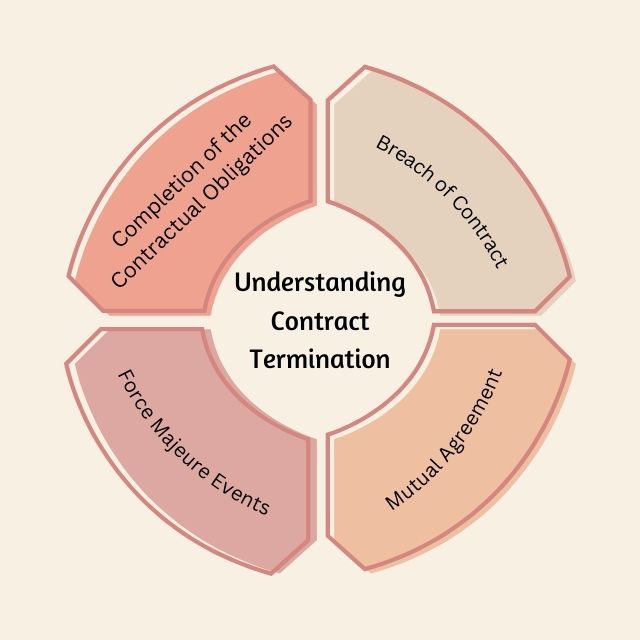In the intricate landscape of business agreements, the decision to terminate a contract is never taken lightly. Whether due to unforeseen circumstances, changing priorities, or contractual breaches, ending a contractual relationship requires careful consideration and adherence to legal and ethical principles. In this comprehensive guide, we explore the nuances of contract termination, offering insights into the legal framework, ethical considerations, and best practices for navigating this complex process.
Understanding Contract Termination
Before delving into the intricacies of contract termination, it’s essential to understand the various scenarios that may warrant such action. Contracts can be terminated for numerous reasons, including:

- Completion of the Contractual Obligations: When the parties involved have fulfilled their obligations as outlined in the contract, it may naturally come to an end.
- Breach of Contract: If one party fails to fulfill its obligations or violates the terms of the contract, the other party may have grounds to terminate the agreement.
- Mutual Agreement: Both parties may agree to terminate the contract by mutual consent, often through a formal agreement known as a termination agreement.
- Force Majeure Events: In cases of unforeseen events beyond the control of the parties, such as natural disasters or government regulations, the contract may be terminated due to force majeure clauses.
Legal Considerations
When considering contract termination, it’s crucial to adhere to the legal framework governing such actions. Key legal considerations include:
- Reviewing the Contract: Carefully review the terms and conditions of the contract to understand the rights and obligations of each party, as well as any provisions related to termination.
- Compliance with Termination Clauses: Many contracts include specific provisions outlining the circumstances and procedures for termination. Ensure compliance with these clauses to avoid potential legal disputes.
- Notice Requirements: Some contracts may require advance notice of termination, specifying the timeframe and method of notification. Failure to provide adequate notice could result in legal consequences.
- Mitigating Damages: Consider the potential financial implications of contract termination and take steps to mitigate damages for both parties involved.
Ethical Considerations
In addition to legal requirements, ethical considerations play a significant role in contract termination. Some ethical guidelines to keep in mind include:
- Honesty and Transparency: Maintain open and honest communication throughout the termination process, providing clear reasons for the decision and offering assistance in transitioning to a new arrangement if possible.
- Fair Treatment: Treat the other party with fairness and respect, recognizing their contributions and honoring any commitments made under the contract.
- Confidentiality: Respect the confidentiality of sensitive information shared during the course of the contract, refraining from disclosing proprietary or confidential information without proper authorization.
- Professionalism: Conduct yourself with professionalism and integrity throughout the termination process, avoiding personal attacks or hostile behavior that could damage professional relationships.
Best Practices for Contract Termination
To navigate the process of contract termination effectively, consider the following best practices:
- Document Everything: Maintain detailed records of all communications, agreements, and actions related to the termination process to protect against potential disputes.
- Seek Legal Guidance: Consult with legal experts specializing in contract law to ensure compliance with relevant legal requirements and minimize legal risks.
- Prioritize Communication: Foster open and transparent communication with the other party, addressing concerns and exploring potential solutions collaboratively.
- Consider Alternatives: Explore alternative dispute resolution methods, such as mediation or arbitration, to resolve conflicts amicably and avoid costly litigation.
Terminating a contract is a complex process that requires careful consideration of legal, ethical, and practical factors. By understanding the legal framework, adhering to ethical principles, and following best practices, businesses can navigate contract termination with integrity and professionalism, safeguarding their interests and preserving valuable relationships in the process. At Legitt AI, we are committed to empowering businesses with the knowledge and tools they need to navigate the complexities of contract management effectively.
Did you find this Legitt article worthwhile? More engaging blogs about smart contracts on the blockchain, contract management software and electronic signatures can be found in the Legitt Blogs section. You may also contact Legitt to hire the best contract lifecycle management services and solutions.
FAQs on Terminating a Contract
What legal considerations should I keep in mind when terminating a contract?
Consider reviewing the contract terms, complying with termination clauses, providing adequate notice, and mitigating damages to minimize legal risks and ensure compliance with legal requirements.
Why are ethical considerations important in contract termination?
Ethical considerations ensure fairness, transparency, and professionalism throughout the termination process, fostering positive relationships and preserving trust between parties involved in the contract.
What are some best practices for contract termination?
Document all communications and actions, seek legal guidance, prioritize open communication, and explore alternative dispute resolution methods to navigate contract termination effectively and minimize conflicts.
How should I handle communication during contract termination?
Foster open and transparent communication with the other party, addressing concerns and exploring potential solutions collaboratively to facilitate a smooth and respectful termination process.
What role does legal guidance play in contract termination?
Legal guidance helps ensure compliance with relevant legal requirements, minimizes legal risks, and provides clarity on legal rights and obligations during the contract termination process.
Why is documentation important during contract termination?
Detailed documentation of all communications, agreements, and actions related to the termination process helps protect against potential disputes and provides evidence of compliance with legal and ethical standards.
How can I mitigate damages during contract termination?
Take proactive measures to minimize financial losses and mitigate damages for both parties involved, such as exploring alternative solutions and negotiating fair resolutions.
What should I do if the other party breaches the contract?
If the other party breaches the contract, review the contract terms, consider legal remedies available, and explore options for resolution, such as negotiation, mediation, or legal action.
How can I maintain professionalism during contract termination?
Maintain professionalism by conducting yourself with integrity, respecting the other party, refraining from personal attacks, and focusing on finding mutually beneficial solutions to the termination process.
What steps should I take to preserve relationships during contract termination?
Prioritize open and transparent communication, treat the other party with fairness and respect, and explore opportunities for collaboration or future partnerships to preserve positive relationships despite contract termination.

